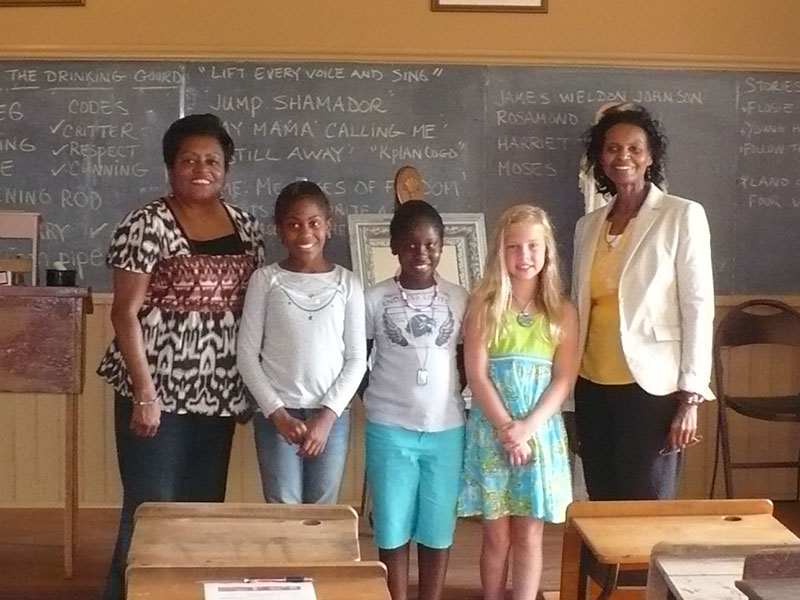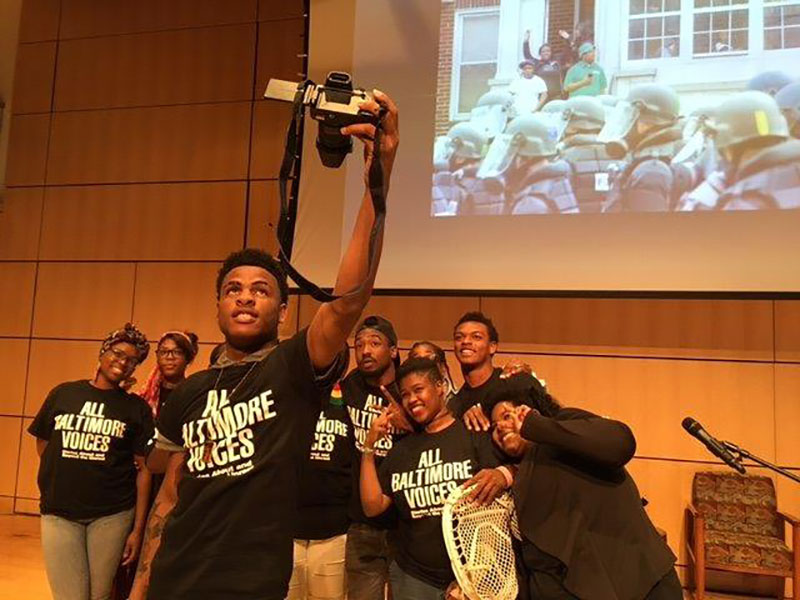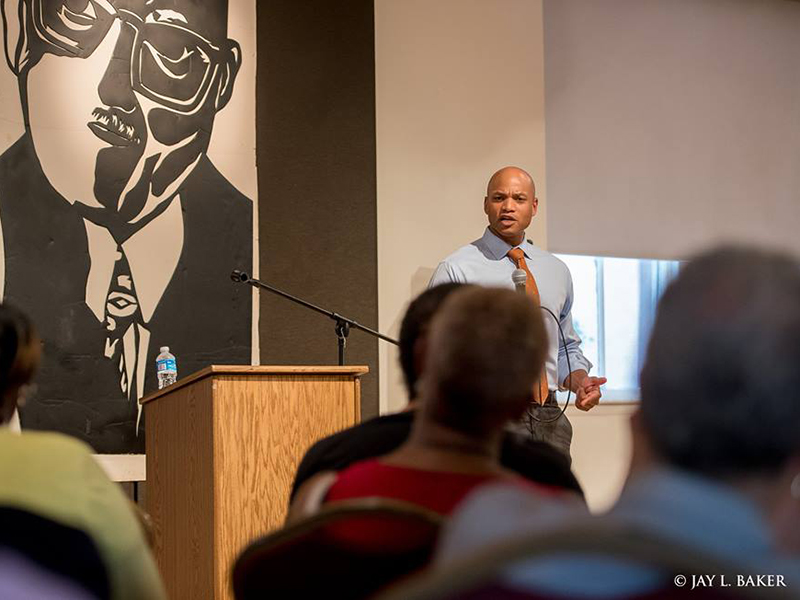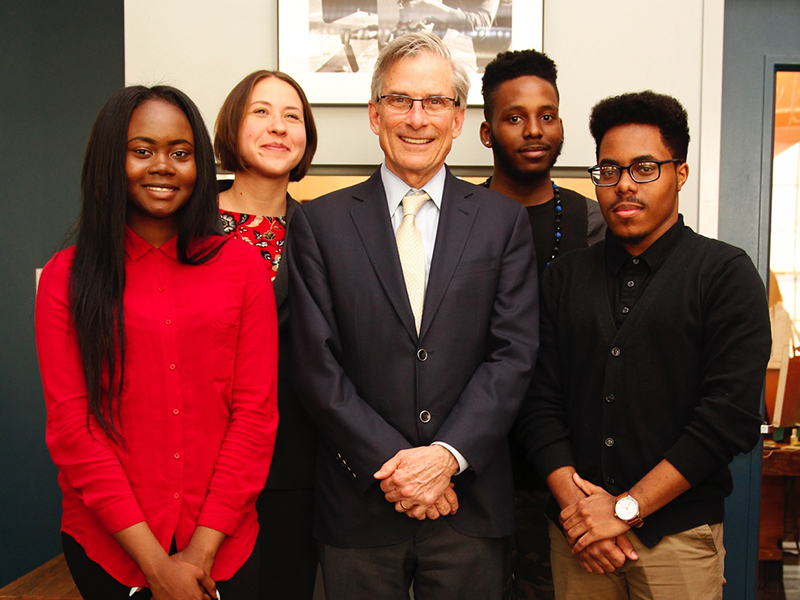We hope our funding has helped position your project for success, but there are requirements that must be met in return. The complete details are outlined in the Grant Administration Procedures document and are listed here for quick access.
- ApplicabilityThese general grant provisions apply to all grants made by Maryland Humanities. Additionally, all conditions, terms, and requirements in the appropriate Grant Application Guide apply to this grant and are incorporated by reference.
In accepting the grant award, the Grant Recipient assumes the legal responsibility for administering the award in accordance with these Grant Administration Procedures and of complying fully with any conditions and restrictions specified in the Grant Agreement. If you have questions about your grant responsibilities, please do not hesitate to contact us.
- Program ChangesAll changes in the scope or the objectives of a project, the project director, or the duration of the project must be approved in writing by Maryland Humanities. This includes changes in speakers and scholars involved in the project. Requests for program changes must be submitted in writing and in advance by the Project Director.
If you find it necessary to extend the grant period for your project, a written or emailed request from the Grant Administrator must be submitted to us for approval prior to the original completion date.
- Budget ChangesThe Grant Recipient must follow the budget submitted with the grant application, subject to the terms of these provisions and any conditions and restrictions specified in the Grant Agreement. The following budget changes must be submitted in advance to us for approval: the addition or deletion of budget items; the inclusion of costs that were specifically disallowed in the Grant Agreement; and the transfer of funds that were budgeted for direct costs to cover indirect costs. The Grant Recipient may transfer funds among direct cost categories, provided the scope or objectives of the project are not changed. Requests for budget changes must be submitted in writing and in advance by the Grant Administrator.
- Crediting Requirements
The Maryland Humanities logo must be used in all materials and products related to or produced by the grant project. Here are two versions of our logo available for your use.
- All publicity, brochures, flyers, reports, press releases, or other printed material must include the following credit line:
“This project was made possible by a grant from Maryland Humanities, with funding received from the Maryland Historical Trust in the Maryland Department of Planning. Maryland Humanities’ Grants Program is also supported by the National Endowment for the Humanities and private funders. Any views, findings, conclusions, or recommendations expressed in this [INSERT APPLICABLE FORMAT (publication) (program) (exhibition) (website)] do not necessarily represent those of Maryland Humanities, Maryland Historical Trust, Maryland Department of Planning, or National Endowment for the Humanities.”
- Maryland Humanities’ support for a project should also be publicly announced and posted at any program.
Failure to properly credit Maryland Humanities’ support is a violation of the terms of this agreement (see Section 20. “Suspension and Termination”).
- Publicity Requirements
The Project Director must:
- Provide Maryland Humanities with the specific dates and times of all events held in connection with the project funded by this grant at least 30 days in advance of each event. This advance notification will enable us to include details about your event in Maryland Humanities press releases, magazines, and other public relations materials.
- Send a press release (preferably an electronic copy) about your project to your local newspaper(s), radio stations(s), television station(s), and cable company. Be sure to acknowledge Maryland Humanities’ support in the press release, and to send copies of the press release and any resulting stories to us.
- Send an invitation or notice of your event to the Maryland Humanities Program Officer for Grants & Community Outreach, Marilyn Hatza, and Grants Program Associate, Adrienne Cassara.
- Prior to your event(s) please send one copy of any brochures, fliers, publications, catalogs, or posters used to publicize the project to Maryland Humanities. If your project resulted in the production of audiotapes, videotapes, or web content, we should receive a copy of the recording or corresponding URL information.
- Write letters to the following people informing them of your grant award and thanking them for making these funds available. You may use this sample, then send copies of these letters to us.
- Both United States Senators for Maryland
- Your Representative in the United States House of Representatives
- Write letters to the following people in Annapolis informing them of your grant award. Send copies of these letters to us.
- Your Senator in the Maryland Senate
- Your Delegate(s) in the Maryland House of Delegates
- The Governor of Maryland
- CertificationsNonprofit Status: The Grant Recipient certifies that it is either a nonprofit organization; an institution of higher education; a state, locally, and federally recognized Indian tribal government; or a group of persons that formed an association to carry out a project. It is the responsibility of the Grant Recipient to notify Maryland Humanities of any changes in its nonprofit status.
Professional Performers: If the project uses professional performers, the Grant Recipient certifies that it does so in compliance with the Labor Standards under Sections 5(i) and 7(g) of the National Foundation on the Arts and Humanities Act of 1965.
Nondiscrimination Statutes: The Grant Recipient certifies that the grant recipient organization is in compliance with the provisions of Title VI of the Civil Rights Act of 1964; Title IX of the Education Amendments of 1972; Section 504 of the Rehabilitation Act of 1973; the Americans with Disabilities Act; and the Age Discrimination Act of 1975; and the regulations issued pursuant thereto to by the National Endowment for the Humanities (Code of Federal Regulations, Title 45, Chapter XI).
This means that no person shall be excluded from participation in, be denied the benefits of, or otherwise be subject to discrimination on grounds of race, color, national origin, handicap, age, or sex for a project funded by Maryland Humanities.
Debarment and Suspension: The Grant Recipient certifies that it is not debarred or suspended or is otherwise excluded from or ineligible for participation in federal assistance programs under the regulations implementing Executive Order 12546, “Debarment and Suspension.” The Grant Recipient further certifies that it shall not make any award or permit any award (subcontract or contract) to any party which is debarred or suspended or is otherwise excluded from or ineligible for participation in federal assistance programs in violation of the regulations implementing Executive Order 12546, “Debarment and Suspension.”
- CopyrightsA Grant Recipient may copyright any work that is subject to copyright and was developed or for which ownership was purchased under this grant. The National Endowment for the Humanities (NEH) reserves for Federal purposes and we reserve for Maryland Humanities purposes a royalty-free, nonexclusive, and irrevocable license to reproduce, publish, or otherwise use the work and authorize others to reproduce, publish, or otherwise use the work.
“Federal purposes” include the use of grant products in activities or programs undertaken by the Federal Government, in response to a governmental request, or as otherwise required by Federal law. “Maryland Humanities purposes” include, but are not limited to, use of grant products in activities or programs undertaken by Maryland Humanities. However, the Federal Government’s and Maryland Humanities’ use of copyrighted materials is not intended to interfere with or disadvantage the Grant Recipient or assignee in the sale and distribution of the grant product.
- Research MisconductBecause the funds for this grant come from the NEH, it will take appropriate action against individuals or organizations upon a determination that misconduct has occurred in proposing, performing, reviewing research or reporting results from research activities funded by NEH in accordance with the NEH Research Misconduct Policy. NEH may also take interim action during an investigation.
Research misconduct is defined as fabrication, falsification, or plagiarism in proposing, performing, or reviewing research, or in reporting research results. The Grant Recipient institution bears primary responsibility for prevention and detection of research misconduct and for the inquiry, investigation, and adjudication of research misconduct alleged to have occurred in association with its own institution.
The NEH Research Misconduct Policy is available on the NEH website or in writing upon request from the NEH Office of Grant Management at (202) 606-8494. Possible misconduct in activities funded by NEH should be reported to the NEH Office of the Inspector General, 1100 Pennsylvania Avenue, NW, Washington, DC 20506, (202) 606-8350.
- RecordkeepingThe Grant Recipient agrees to maintain records and accounts consistent with generally accepted accounting principles and to provide the necessary fiscal control to insure the proper disbursement of and accounting for grant funds. The Grant Recipient certifies that accounts and supporting documentation relating to project expenditures will be adequate to permit an accurate and expeditious audit and will be kept until the date specified in the Grant Agreement after the close of this grant. An audit may be made at any time by Maryland Humanities or its designated representatives or any applicable agency of the United States Government. The Grant Recipient also agrees to maintain records to document all in-kind and third-party contributions indicated in the approved budget. All records pertaining to in-kind contributions should indicate the basis for determining the value of the contributions. With the exception of reporting forms and methods of payment, the uniform administrative requirements of Office of Management and Budget Circular A-110 apply to Maryland Humanities Grant Recipients. The administrative requirements that are most relevant have been detailed in these Grant Administration Procedures.
Records and documentation for the grant must be maintained until the date specified in the Grant Agreement.
- PaymentsGrant Recipients may receive their grant award on an advance or reimbursement basis. Awards totaling $1,200 or less may be advanced in full in one installment. Awards over $1,200 may be advanced for sums that in total are not more than 90% of the total award. The final 10% of all grants over $1,200 will be paid upon receipt of the Final Narrative and Financial Reports and the Payment Request Form.
In the rare case of an award totaling over $10,000, the Maryland Humanities may advance the Grant Recipient up to $10,000 for a three-month period. When a Grant Recipient’s cash needs exceed $10,000 for a three-month period, advances will be limited to the Grant Recipient’s anticipated cash expenditures for a thirty-day period.
The Payment Request Form (included as part of this packet) must be filled out and submitted to Maryland Humanities by the Grant Administrator to receive grant funds. The Grant Recipient should allow two to three weeks for a check to be issued.
All activities that are paid from a Maryland Humanities grant award must have occurred during the official grant period. The grant period begins on the date specified in the application or the date on which Maryland Humanities approves funding for the grant and concludes sixty days following the completion of project activities funded by Maryland Humanities.
- Travel Costs and Per DiemIf your grant project uses awarded funds for necessary travel reimbursement, the amount covered by Maryland Humanities should not to exceed $.42 per mile for autos, and economy fare for approved air (U.S. carriers only) and train travel directly related to the project. A per diem of $100 per day for lodging and $45 per day for meals may be paid where travel for a 24-hour period is necessary. When it is not necessary to travel over a 24-hour period, a per diem of $20 per day for meals may be paid.
- Project IncomeProjects should be open to the public without charge. Any exceptions must be specified in the grant application or approved in advance by Maryland Humanities. Any income from a project supported by a Maryland Humanities grant award during the grant award period (registration, admission fees, sale of publications, sale of video or audiotapes, etc.) may be used as a part of the Grant Recipient’s matching requirement or to cover additional direct project costs
- MatchingCash and in-kind contributions cannot count towards satisfying a matching requirement of a Maryland Humanities grant if they have been or will be counted towards satisfying a matching (or cost-sharing) requirement on another federal grant, a federal procurement contract, or any other award of federal funds.
- IRS ReportingIt is the Grant Recipient’s responsibility to submit appropriate forms (such as 1099s) to the IRS for any individual to whom the Grant Recipient has paid compensation.
- AuditsA non-Federal entity that expends $750,000 or more during the non-Federal entity’s fiscal year in Federal awards must have a single or program-specific audit conducted for that year in accordance with 2 CFR Subpart F 200.500 et. seq.
- Catalog of Federal Domestic AssistanceGrants typically are funded through the National Endowment for the Humanities, Federal/State Partnership, CFDA 45.129. However, individual grants may be supported through other types of funding. Grant Recipients are encouraged to consult their Grant Agreement or Maryland Humanities’ staff for specific information regarding the funding source of their individual grant.
- Interest Earned on AdvancesIf a Grant Recipient receives less than $120,000 per year in advances of Federal funds, it is not required that those funds are maintained in an interest-bearing account. If a Grant Recipient chooses to deposit funds in an interest-bearing account, it may retain the first $250 in interest earned each fiscal year. Interest in excess of this amount on funds advanced by Maryland Humanities shall be returned to Maryland Humanities.
- Participant SurveysFor each event, Grant Recipients are encouraged to survey participants about their response to the program. Maryland Humanities prefers this standard participant survey to be used, so responses are collected in a uniform format. Email Theresa Worden, tworden@mdhumanities.org, to discuss customization and to get copies of this survey for use at your program.
If you distribute your own audience questionnaire, you will be asked to upload a copy of your survey and summarize the findings in your Final Report.
- ReportingThe Grant Project Team has 60 days from the end of the grant period to submit the Final Report, which includes the Final Financial Report, the Program Event Log, and any Participant Survey Forms. These items are required to successfully close your grant. Further information and directions for completing the online Final Report are available on the Final Reporting web page on the Maryland Humanities website.
If, at the end of the project, surplus or unobligated Maryland Humanities grant funds remain, they must be returned to us in the form of a check in the exact amount, made payable to “Maryland Humanities.” Any costs paid with Maryland Humanities funds under this grant which are subsequently found to be disallowable under audit must be refunded to Maryland Humanities.
Failure to file the Final Reports could result in having to return your grant funds to the Council and could render your organization ineligible for future funding from the Council or the National Endowment for the Humanities.
- Suspension and TerminationIf Maryland Humanities should ascertain that the terms of this agreement are not being met, it will inform the Grant Recipient in writing. Failure to comply with the terms and conditions of this grant agreement may result in the suspension or termination of this grant and recovery of grant funds by Maryland Humanities. If, for some reason, the Grant Recipient is unable to complete the project, written notice should be sent to Maryland Humanities, so that arrangements for restitution of grant funds and termination of this agreement can be made.




